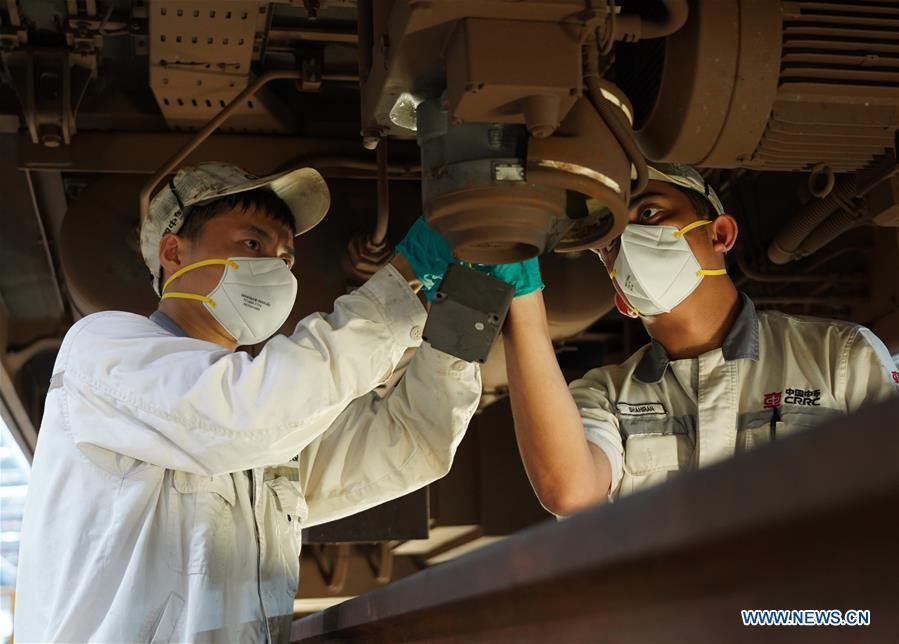Chinese technology transfer boosts railway know-how in Malaysia
2018-09-10 09:08:59
Seven-and-a-half years later, the 33-year-old Mahizan has long been a train expert. His company, now named CRRC Kuala Lumpur Maintenance Company or CKM, has become a major player in the field, providing Maintenance, Repair and Overhaul (MRO) for local train services including Electric Multiple Units trains and light rail transit (LRT) vehicles.
Mahizan works on the LRT line that travels through Kuala Lumpur. For him, CKM not only creates jobs for the locals, but also provides opportunities for Malaysians to learn the technology and know-how about trains.
"I have gained a lot from the company, the main example is through the transfer of technology," said Mahizan. "In Malaysia, the locomotive industry is very limited. So when the Chinese company came here, it was very impactful and Malaysians could learn more about locomotives."
Mahizan's feeling is not unique among CKM's staff.
In a maintenance facility in Seremban, some 70 km from Kuala Lumpur, 25-year-old Wan Azhim Syammel Bin Wan Mohd Lutpi is trying hard to pick up knowledge and skills about trains.
He has worked for the company for over a year after graduating from a local university and is now an assistant engineer. He has received training during the first months on the job, but he hopes to learn more from his Chinese colleagues.
"The environment for working here is good. The specialists and workers from China are friendly and can transfer their technology to the locals," he said.
The local staff and their growth are central to the company's strategy, explained Luo Wei, the business director. "We focus a lot on our local staff, on their wellbeing, on their skills, on their channel for promotion."
The company provides on-the-job training, invites Chinese railway experts to Malaysia for training sessions, while sending company staff and even the staff of its customers to pursue higher degrees in China's renowned universities like Tongji University to further improve their skills, said Luo.
The company attaches great importance to localization for long-term development, he added. CKM gave priority to the locals when recruiting, some 80 percent of its staff of around 115 people are local.
"Many of our management including the chief operating officer are Malaysians," said Luo. "They have a better understanding on the law and the culture of Malaysia. Our company will be more efficient and competitive by bringing them into management."
Luo said the company hopes to build a sense of belonging among its staff. "We hope that they would think this is not only a Chinese company but also a Malaysian company."
Mahizan admitted that communication posed a challenge when he first started working with his Chinese colleagues, "but as time went by, chemistry emerged between our Chinese and local staff," he said.
It's easier for Wan Azhim to get along with his colleagues, as many of them speak good English. "We also use online translation applications or simply show pictures on phones to communicate," he said.
Apart from the maintenance company, CRRC Zhuzhou Locomotive has a rolling stock center in Malaysia's Batu Gajah as its manufacturing base in Southeast Asia. Becoming fully operational in 2015, CRRC rolling stock center can now manufacture up to 200 carriages a year and conduct major overhauls.
CRRC is eyeing further investment to expand the capacity of the rolling stock center, Luo said.
The Malaysian government led by Prime Minister Mahathir Mohamad has repeatedly said that it welcomed foreign investment, including those from China, that could create jobs for the locals and transfer the knowledge of technology.
"The increasing demand for railways in Southeast Asia including Malaysia, as well as the growth of the population and the economy will have a positive impact on the market and for our company," said Luo, "We are optimistic about the future of this market."
- Previous:Nigeria encouraged to 'seize the moment' at FOCAC
- Next:最后一页
